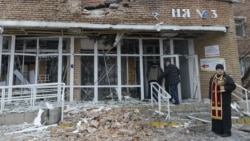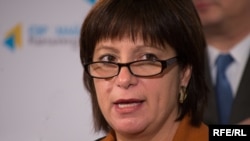Russia's Ukraine Actions Have Made Its Economy Vulnerable -- UK PM's Spokesman
LONDON, Dec 16 (Reuters) - Russia's isolation over its actions in Ukraine have made it more vulnerable to global economic shocks, British Prime Minister David Cameron's spokesman said on Tuesday.
A fall in oil prices by almost a half since June has put severe strain on Russia's oil-dependent economy, with a collapse in the ruble and Russian stocks adding to the pressure Western sanctions are placing on President Vladimir Putin.
"The fall in the global price for oil is a global phenomenon but ... Russia has made itself more vulnerable to economic shocks ... as a result of the relative isolation through sanctions that it has faced because of events in Ukraine," Cameron's spokesman told reporters.
"If Russia continues to choose not to take the path of de-escalation it will continue to face consequences."
Ukraine Ministers Pledge Corruption Fight To Win Aid
BRUSSELS (AFP) -- Top Ukraine ministers vowed Tuesday to root out graft in what they called the most corrupt country in Europe to meet the demands made by international partners before they stump up more aid.
Finance Minister Natalie Jaresko and Economy Minister Aivaras Abromavicius told AFP in an interview that Kiev wanted a clear break with the past and to radically reduce the role of the state.
The International Monetary Fund, European Union and United States have pledged large amounts of aid to help Ukraine as it fights Russian-backed rebels in the east but they also demand that Kiev ends the corruption that has bedevilled the country for years.
"Ukraine is the most corrupt country in Europe and we must lift ourselves out of this," Abromavicius said, describing his own ministry as a bureaucratic "monster" that needed to be broken up or closed down.
"We don't have a choice, we need to be credible very quickly," added Jaresko, a US citizen who once worked in the State Department. "We need the support of our international partners."
Ukraine was plunged into crisis in November 2013 when then pro-Russian president Viktor Yanukoyvch backed out of an association agreement with the EU under pressure from the Kremlin.
The decision sparked huge pro-EU demonstrations against Yanukovych who fled to Russia in February after what Moscow termed a Western-backed "coup" in Kiev.
Since then Russia has annexed Crimea and Kiev has battled pro-Moscow separatists in the east in a conflict which has cost more than 4,600 lives and displaced more than a million people.
The European Union has offered Ukraine about 1.6 billion euros ($2 billion) in short-term assistance and put together a wider package worth about 11 billion euros.
The IMF has given Kiev about $17 billion and has estimated it probably needs another $15 billion in immediate funding as the economy continues to shrink.
Just in from RFE/RL's news desk:
Ukrainian President Petro Poroshenko has said the military situation in eastern Ukraine was quiet overnight, with no shelling reported.
Poroshenko said in Kyiv on December 16 that "not a single shot was fired" overnight and there were no breaches of the fragile cease-fire in the region where government forces are fighting against pro-Russian separatists.
The cease-fire was originally agreed in early September during talks in Minsk, but it has been repeatedly violated.
A proposed meeting for further talks between Ukraine, Russia, the separatists, and the Organization for Security and Cooperation in Europe (OSCE) had been expected last week, but the Ukrainian negotiator accused the rebels of violations and said it was too early to hold new talks.
A statement by the pro-Russian separatists in Donetsk on December 16 said Ukrainian forces "carried out artillery strikes" on Donetsk airport during the night.
European Union foreign-policy chief Frederica Mogherini began a two-day visit to Kyiv on December 16.





